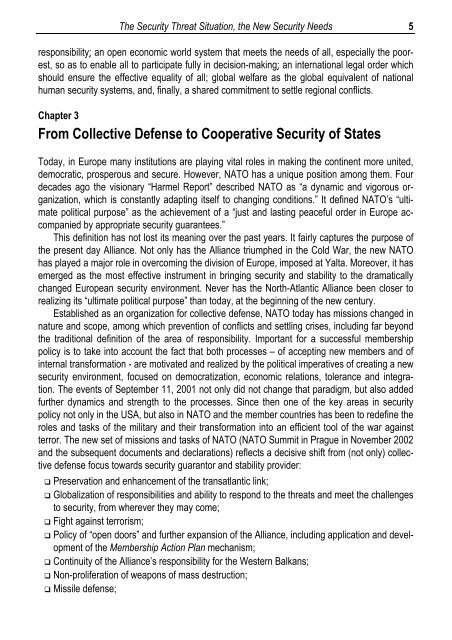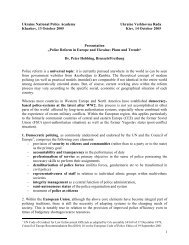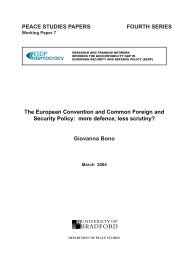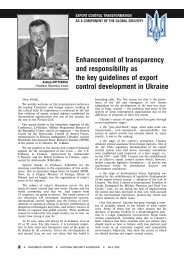Civil-Military Relations and Democratic Control of the Security Sector
Civil-Military Relations and Democratic Control of the Security Sector
Civil-Military Relations and Democratic Control of the Security Sector
Create successful ePaper yourself
Turn your PDF publications into a flip-book with our unique Google optimized e-Paper software.
The <strong>Security</strong> Threat Situation, <strong>the</strong> New <strong>Security</strong> Needs<br />
responsibility; an open economic world system that meets <strong>the</strong> needs <strong>of</strong> all, especially <strong>the</strong> poorest,<br />
so as to enable all to participate fully in decision-making; an international legal order which<br />
should ensure <strong>the</strong> effective equality <strong>of</strong> all; global welfare as <strong>the</strong> global equivalent <strong>of</strong> national<br />
human security systems, <strong>and</strong>, finally, a shared commitment to settle regional conflicts.<br />
Chapter 3<br />
From Collective Defense to Cooperative <strong>Security</strong> <strong>of</strong> States<br />
Today, in Europe many institutions are playing vital roles in making <strong>the</strong> continent more united,<br />
democratic, prosperous <strong>and</strong> secure. However, NATO has a unique position among <strong>the</strong>m. Four<br />
decades ago <strong>the</strong> visionary “Harmel Report” described NATO as “a dynamic <strong>and</strong> vigorous organization,<br />
which is constantly adapting itself to changing conditions.” It defined NATO’s “ultimate<br />
political purpose” as <strong>the</strong> achievement <strong>of</strong> a “just <strong>and</strong> lasting peaceful order in Europe accompanied<br />
by appropriate security guarantees.”<br />
This definition has not lost its meaning over <strong>the</strong> past years. It fairly captures <strong>the</strong> purpose <strong>of</strong><br />
<strong>the</strong> present day Alliance. Not only has <strong>the</strong> Alliance triumphed in <strong>the</strong> Cold War, <strong>the</strong> new NATO<br />
has played a major role in overcoming <strong>the</strong> division <strong>of</strong> Europe, imposed at Yalta. Moreover, it has<br />
emerged as <strong>the</strong> most effective instrument in bringing security <strong>and</strong> stability to <strong>the</strong> dramatically<br />
changed European security environment. Never has <strong>the</strong> North-Atlantic Alliance been closer to<br />
realizing its “ultimate political purpose” than today, at <strong>the</strong> beginning <strong>of</strong> <strong>the</strong> new century.<br />
Established as an organization for collective defense, NATO today has missions changed in<br />
nature <strong>and</strong> scope, among which prevention <strong>of</strong> conflicts <strong>and</strong> settling crises, including far beyond<br />
<strong>the</strong> traditional definition <strong>of</strong> <strong>the</strong> area <strong>of</strong> responsibility. Important for a successful membership<br />
policy is to take into account <strong>the</strong> fact that both processes – <strong>of</strong> accepting new members <strong>and</strong> <strong>of</strong><br />
internal transformation - are motivated <strong>and</strong> realized by <strong>the</strong> political imperatives <strong>of</strong> creating a new<br />
security environment, focused on democratization, economic relations, tolerance <strong>and</strong> integration.<br />
The events <strong>of</strong> September 11, 2001 not only did not change that paradigm, but also added<br />
fur<strong>the</strong>r dynamics <strong>and</strong> strength to <strong>the</strong> processes. Since <strong>the</strong>n one <strong>of</strong> <strong>the</strong> key areas in security<br />
policy not only in <strong>the</strong> USA, but also in NATO <strong>and</strong> <strong>the</strong> member countries has been to redefine <strong>the</strong><br />
roles <strong>and</strong> tasks <strong>of</strong> <strong>the</strong> military <strong>and</strong> <strong>the</strong>ir transformation into an efficient tool <strong>of</strong> <strong>the</strong> war against<br />
terror. The new set <strong>of</strong> missions <strong>and</strong> tasks <strong>of</strong> NATO (NATO Summit in Prague in November 2002<br />
<strong>and</strong> <strong>the</strong> subsequent documents <strong>and</strong> declarations) reflects a decisive shift from (not only) collective<br />
defense focus towards security guarantor <strong>and</strong> stability provider:<br />
Preservation <strong>and</strong> enhancement <strong>of</strong> <strong>the</strong> transatlantic link;<br />
Globalization <strong>of</strong> responsibilities <strong>and</strong> ability to respond to <strong>the</strong> threats <strong>and</strong> meet <strong>the</strong> challenges<br />
to security, from wherever <strong>the</strong>y may come;<br />
Fight against terrorism;<br />
Policy <strong>of</strong> “open doors” <strong>and</strong> fur<strong>the</strong>r expansion <strong>of</strong> <strong>the</strong> Alliance, including application <strong>and</strong> development<br />
<strong>of</strong> <strong>the</strong> Membership Action Plan mechanism;<br />
Continuity <strong>of</strong> <strong>the</strong> Alliance’s responsibility for <strong>the</strong> Western Balkans;<br />
Non-proliferation <strong>of</strong> weapons <strong>of</strong> mass destruction;<br />
Missile defense;<br />
5

















